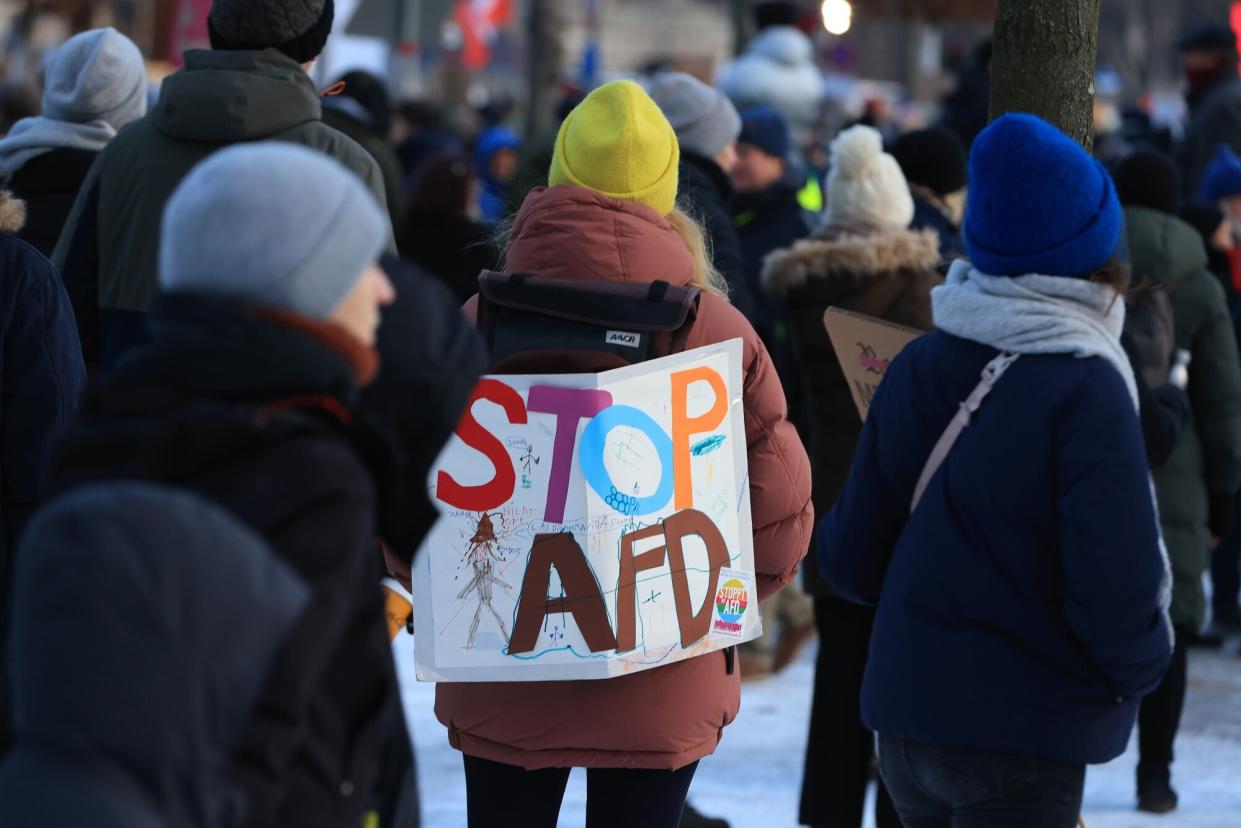German Far-Right AfD Party Loses Ground After Mass Protests

- Oops!Something went wrong.Please try again later.
(Bloomberg) -- Germany’s far-right Alternative for Germany party lost ground in two new opinion polls, suggesting recent nationwide demonstrations against the anti-immigrant group may be impacting voting intentions.
Most Read from Bloomberg
Apple Dials Back Car’s Self-Driving Features and Delays Launch to 2028
China Weighs Stock Market Rescue Package Backed by $278 Billion
Ackman Boosts Israel Support With 5% Stake in Tel Aviv Bourse
Hundreds of thousands of protesters took to the streets at the weekend following a report about a meeting attended by AfD officials where a Nazi-like “re-migration” scheme was discussed. Members of the main opposition conservatives were also at the November gathering at a hotel near Potsdam, according to the report.
An Insa survey for Bild newspaper published Tuesday showed that backing for the AfD slipped to 21.5%, from 23% the previous week. It remained in second place overall behind the conservative CDU/CSU alliance, which dropped half a percentage point to 30.5%, according to the Jan. 19-22 poll of 2,006 citizens.
A separate Jan. 16-22 Forsa survey of 2,503 people for media group RTL/ntv showed a two-point decline for the AfD to 20%, with the CDU/CSU unchanged on 31%.
Bild said the AfD had suffered its biggest weekly decline in almost two years, while Insa head Hermann Binkert told the paper that the demonstrations against the party are backed by 37% of the population and are “having an effect.”
At the same time, there was little cheer for Chancellor Olaf Scholz’s ruling coalition. Support for the three parties in his alliance — his Social Democrats, the Greens and the Free Democrats — remained stuck on 31%, more than 20 points below their combined result in the 2021 general election.
Read More: Agrarians at the Gate Lead Revolt Against German Government
In a post Tuesday on the AfD’s X account, the party said the “scandal” around the “re-migration” report and the mass protests were designed to distract attention from “the country’s real problems.” It accused politicians and the mainstream media of pursuing “the mere preservation of power.”
Deutsche Bank AG Chief Executive Officer Christian Sewing on Tuesday joined other top German business figures who have expressed concern about the potential impact the AfD’s rise could have on investment flowing into Europe’s biggest economy.
Read More: Infineon CEO Joins German Business Leaders to Warn of Far Right
“I do not believe that right-wing extremist tendencies in any form are good for the country, for our general welfare,” Sewing was quoted as saying by broadcaster Welt.
Finance Minister Christian Lindner, the chairman of the pro-business FDP, suggested Tuesday that the way to address the AfD — which has particularly strong support in the former communist eastern regions — is to “provide answers to the questions posed” by those who support the party.
These related in particular to issues including “migration, bureaucracy, the question of how we deal with rural areas and the freedom of private life,” Lindner told Welt.
He struck a cautious tone on the possibility of mounting a legal challenge to the AfD following Tuesday’s ruling by Germany’s top court that stripped another far-right group of public funding for six years.
Constitutional Court judges granted a suit filed by the federal government together with both houses of parliament that accused the group — formerly the NPD and now known as Die Heimat — or “The Homeland” — of being a threat to Germany’s democratic order.
“When dealing with the AfD, we should look very carefully at what is constitutionally necessary and possible,” Lindner told Welt.
“The impression must not be created that the parties of the democratic center want to defend themselves against unwelcome competition by resorting to party law,” he added. “This must all be done in a legally sound manner.”
--With assistance from Karin Matussek.
(Updates with AfD comment in seventh paragraph)
Most Read from Bloomberg Businessweek
Hong Kong’s High Rents Create a New Type of Cross-Border Commuter
Goldman, Lazard Look to Ex-Spies to Gain an Edge in Volatile World
Should I Tell My Colleagues (or My Boss) About My Bipolar Diagnosis?
©2024 Bloomberg L.P.


